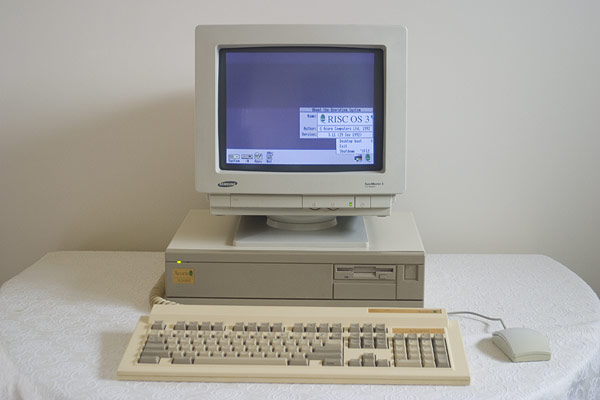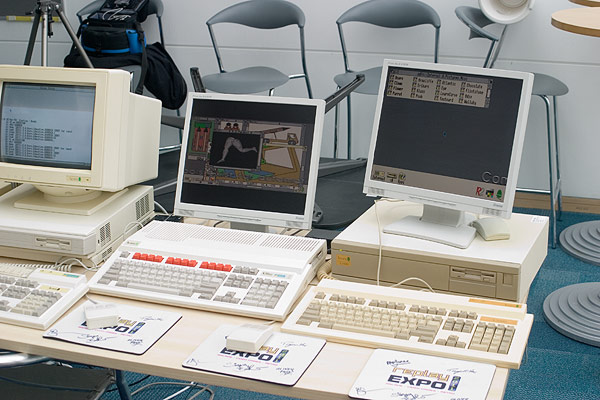Acorn A5000
The Acorn A5000 was launched in 1991 and featured an ARM3 processor running at 25MHz as standard with the option of 2 or 4MB of RAM. It was also the first Acorn computer to offer an IDE interface on the motherboard and a high density floppy drive controller. Later models of the A5000 had the clock speed of the main processor upgraded to 33MHz.

I acquired my A5000 from a fellow forum member on the Stairway to Hell forums after helping him recover data from the hard drive. At the time, the A5000 did not boot correctly due to track damage caused by a leaking battery and you can read about the work required to clean and repair the A5000 on the A5000 restoration page.
This particular A5000 is an Issue 2 motherboard with 2MB of RAM fitted on board and a further 2MB of RAM fitted to an official Acorn RAM upgrade daughter board. The clock speed is the slower 25MHz version.
The A5000's internal IDE interface is quite a basic affair as it does not support partitions and the maximum drive size that RISC OS 3 supports is 512MB.
Expansions in this A5000
- Acorn 2MB RAM upgrade
- IDE to Compact Flash adapter with 2GB CF card (512MB available)
- Acorn Econet Module (issue 2)
- Design-IT (i-Cubed) EtherLAN 550
Beeb@30
On the 25th of March 2012, I took this A5000 to the Beeb@30 event which celebrated the 30th birthday of the BBC Micro. On the journey down to Cambridge, the battery failed causing the CMOS settings to be lost and as such once re-configured, I simply ran the Acorn A5000 rolling demo which showcases what the A5000 is capable of.

Repair/Change history
In February 2012, the A5000 came to me in a sorry state with track damage surrounding the RTC/CMOS chip due to a leaky battery and would not boot. The IDE connector was also damaged. The CMOS chip was replaced and the tracks repaired by replacing them with Kynar Wrapping wire.
The original Hard Disc had been removed by the previous owner and it required a replacement. A Compact Flash to IDE card was fitted providing the maximum amount of storage that the A5000 is capable of using its internal IDE interface which is 512MB per disc drive.
An Econet module was fitted to allow for easier installation of files to the Compact Flash drive.
The EtherLAN 510 card was fitted to give the A5000 TCP/IP connectivity but was later swapped out for the EtherLAN 500 card.
In March 2012, the newly fitted battery failed after only 36 days of use (which is rare but can happen with rechargeable batteries). A replacement battery was fitted to maintain CMOS settings and real time clock data.
In October 2012, the audio ceased to work consistently failing after 10 to 15 minutes of use. The cause of the failure was a dry joint on one of the surface mount IC's (a LM324 op-amp). Reflowing the solder around the IC fixed the issue.
In October 2012, the floppy drive stepper control failed. This appears to be the 82C710 controller which controls the stepping and direction of the movement of the heads. The direction signal appears to be held high which causes the heads to travel to Track 0 and stay there.
In October 2013, the EtherLAN 500 card was removed and an Acorn Econet module was fitted.
In November 2013, an EtherLAN 550 card was fitted.
Battery Maintenance Schedule
The original battery was replaced in February 2012. The replacement battery failed and was replaced in March 2012.
The next battery replacement is due in March 2015.
Translate this site
Acorn Kit
A5000 Maintenance
RISC OS links
RISC OS is the operating system that runs on all Archimedes and RISC PC's from Arthur in the beginning, to RISC OS 2 and onwards to RISC OS 4, 5 and 6 today.
IconBar posts
News
- RISC OS continues to grow on GitHub
- Archive magazine updates
- Wakefield 2022 will go ahead on Saturday 21st May
- Drag'n'Drop 11i2 edition reviewed
- RISCOSbits releases some more risque hardware
Forums
- RISCOSbits releases some more risque hardware
- Is BASIC still useful for coding?
- Is BASIC still useful for coding?
- Three RISC OS Show dates for your 2022 diary
- Iris Web Browser receives January update
provided courtesy of The IconBar
JASSP Forums
The JASSP project run by Jon Abbott is an attempt to acquire the rights to all of the Acorn Archimedes games back catalogue and archive them for the future.
Archiving the games is just half of the battle. Jon has written ADFFS which allows those archived images to be loaded and played on any ARM based machine running RISC OS which involves patching these games to run on later hardware using a JIT/VM style environment within ADFFS to allow the games to be patched to run safely on the latest hardware.
- ADFFS • Re: ADFFS 2.80 public beta
- ADFFS • Re: ADFFS 2.80 public beta
- ADFFS • Re: ADFFS 2.80 public beta
- ADFFS • Re: ADFFS 2.80 public beta
- ADFFS • Re: ADFFS 2.80 public beta
- General • Re: Help playing games
- General • Help playing games
- ADFFS • Re: ADFFS 2.80 public beta
- ADFFS • Re: ADFFS 2.80 public beta
- ADFFS • Re: ADFFS 2.80 public beta
- ADFFS • Re: ADFFS 2.80 public beta
- General • Re: Virtual Golf
- ADFFS • Re: ADFFS 2.80 public beta
- General • Re: Virtual Golf
- ADFFS • Re: ADFFS 2.80 public beta